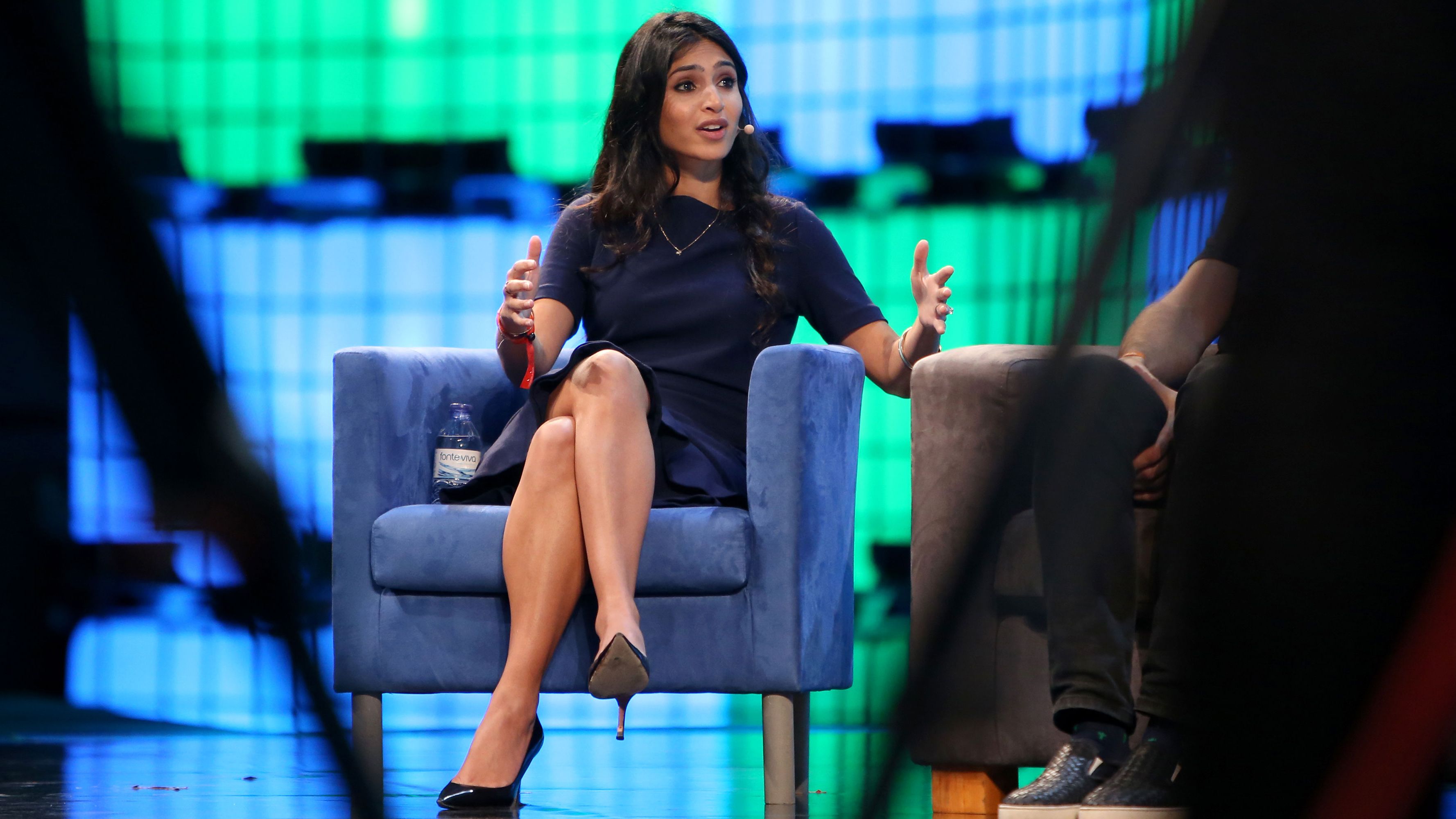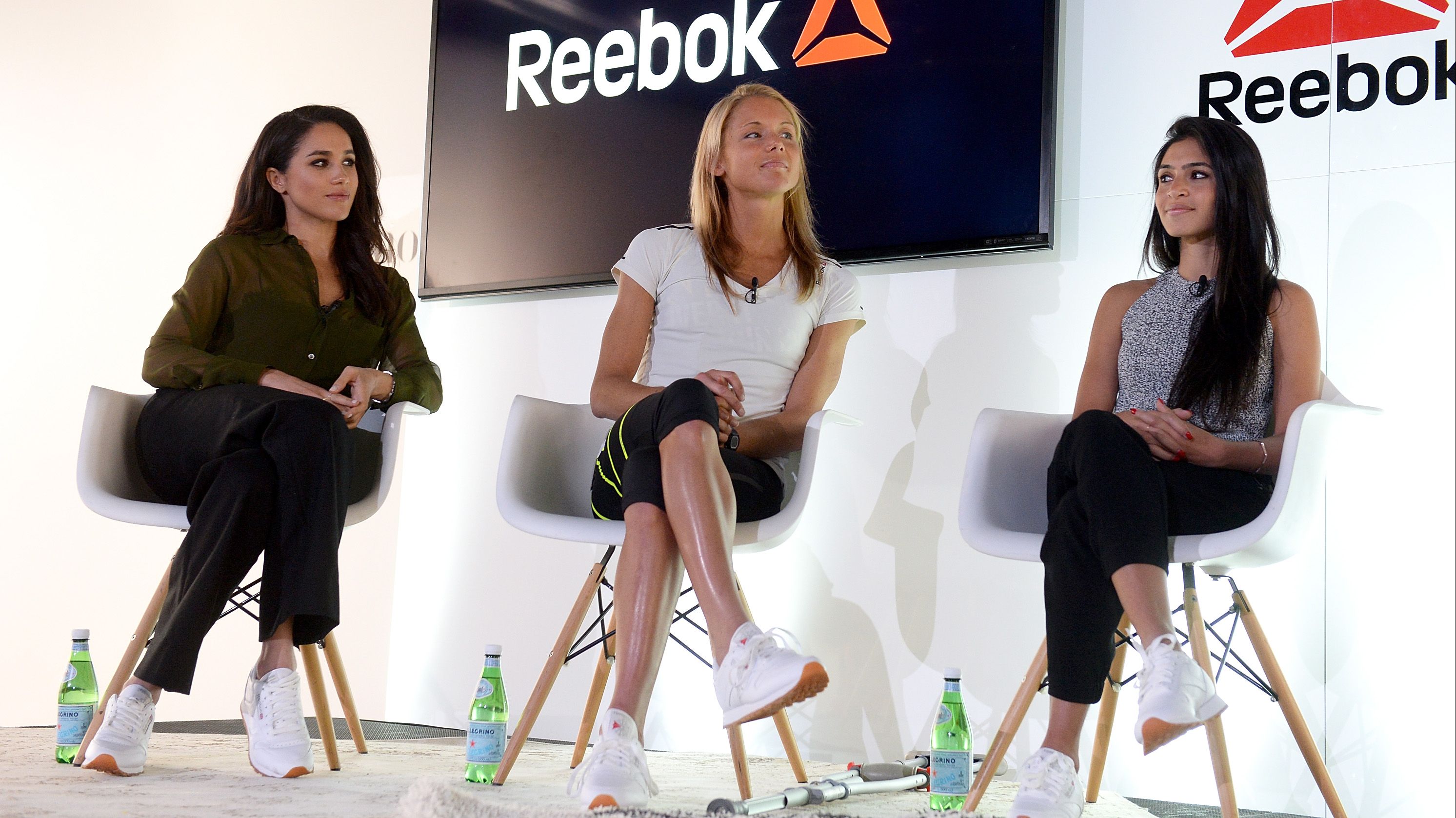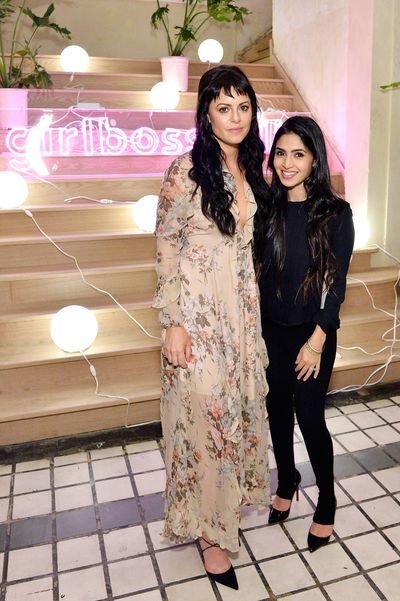The Founder of ClassPass Is Finally Opening Up
Even through the company's recent drama, Payal Kadakia refuses to break a sweat.


The color scheme of the ClassPass offices in New York City is dominated by a breezy turquoise. It appears on table legs, rocking chairs, and in the company logo, formed out of shoelaces. The founder, Payal Kadakia, leans into the fashion-forward lobby to introduce herself, flashing a bright smile beneath long, bouncy hair. The whole effect is dazzling.
She wants to discuss ClassPass's future, but I'm keen to talk about its past: After a meteoric rise to cult-favorite status as the go-to fitness service for millennials across the country (the company booked more than one million classes in 2014), ClassPass raised its prices nearly 200 percent last year, leading to outrage among clientele and—perhaps not directly—the departure of Kadakia from the company's senior-most leadership position.
At an event soon after the price hikes were made public, Kadakia said she was taken aback by the backlash. She still stands behind the move. "I never feel bad. You can't feel bad—you have to just make the best decision you can at the time you're in, and be like, that's the decision I believe in," she says now. "Make a decision, though. The worst thing you can do is sit there and do nothing, right?"
"I never feel bad. You can't feel bad—you have to just make the best decision you can at the time you're in, and be like, that's the decision I believe in."
That definitive inertia is what brought Kadakia here in the first place. In 2011, she was quietly raising money for her lightbulb idea—a fitness service that gave users membership to not just one gym, but all of the best boutique exercise classes in the area—on the side of her "real" job at Warner Music Group when a mentor told her that if Kadakia didn't trust her idea enough to pursue it full-time, she wasn't worth investing in. "Ever since that day, February 11 of 2011, I never, ever looked back. Just straight forward," Kadakia says. "I'm going to go and get everyone to class."
The company officially launched in 2013, giving users the opportunity to experiment with all different kinds of exercise—spinning, hip-hop dancing, Pilates—at a major discount from the studio sticker price. Fitness enthusiasts flocked to the brand. By 2016, the company was valued at nearly half a billion dollars.
But last year was a tough one for the startup. They upped the monthly unlimited membership from $99 to $125 in July 2015, then to $190 for New York-area users in April 2016 before finally abandoning the unlimited model altogether seven months later (the cheapest package is now $45 for three classes). The customer reaction was swift.
goodbye @classpass. increasing the monthly price by $100?! i'm better off re-joining equinox. pic.twitter.com/vpvsvXdai1April 27, 2016
Dear @classpass, maybe you should've thought about your business model before deciding it didn't work. The WORSTNovember 2, 2016
.@classpass is discontinuing its unlimited membership!!! Hell of a business plan they have going on over there. #classpassNovember 2, 2016
.@classpass you want to raise memberships from $99 > $125 > $190 in less than a year?! pic.twitter.com/Z8pufyoPeCApril 27, 2016
But Kadakia had been watching the company's model become unsustainable ever since its founding. According to Fast Company, leaked internal documents show that in 2015 the business was having trouble bringing in revenue. "We launched unlimited and it was great and we decided to keep it. Engagement just kept going up. People were working out more and more, trying more studios, more people were joining," she says. "Given we had grown so much and the product experience was better, would people be okay with [a price increase]? Would the product still have growth and virality?" Kadakia wonders. "We started testing those packs, and they did phenomenally well."
Stay In The Know
Get exclusive access to fashion and beauty trends, hot-off-the-press celebrity news, and more.
Kadakia's version of events breezes over any suggestion that customers might not be psyched to pay more money for less product. In fact, ClassPass has disclosed that it lost 10 percent of its users due to the price increases. But when pressed about the social-media rage of the last year, Kadakia's smile doesn't break. "Yeah, I mean, I'm not going to sugarcoat it," she says. "I built a product to inspire people, so it's not great. That being said, I do believe it's an amazing product. I think the engagement on it speaks for itself."

'Kadakia, far right, appears on a panel for Reebok in April 2016 with (from left) actress Meghan Markle and endurance athlete Amelia Boone.'
She released the news of the subscription model change to users in an email on November 2, 2016. "Having to write that email… I wish I could have—and I still wish—that I could just show people what the product is going to look like in a year. Or two years. Because that's why we did it. It's going to be bigger, it's going to be better, it's going to reach millions more people," she says enthusiastically. "I know in my heart that the product's going to be better, and I could write that email and I wanted to convey that, but I know that until people use it, they won't fully see it."
Instead of watching the reactions on Twitter, Kadakia buried herself in meetings. "I spent that day doing product innovation, on purpose. Because I'm like, the best thing I could do today is find a way to give back," she says. Many of those innovations have already been rolled out: members can now take classes in the comfort of their homes via video-on-demand and go to their favorite studios more than three times per cycle.
"Having to write that email…I wish I could just show people what the product is going to look like in a year."
Still, in March, ClassPass announced that Kadakia was swapping roles with her colleague, Fritz Lanman: Lanman was appointed CEO, while Kadakia became executive chairman. The move came after months of rumors that Kadakia was being ousted, with some sources telling Business Insider that she had "effectively stopped being CEO" as early as last summer.
"I had started to take more of an operating role, and this was a title mismatch," Lanman toldFortune in March. "The CEO was supposed to be the operator, and the executive chairman was supposed to be the person handling more key strategic projects. So we just changed titles because we organically evolved to this place."
Kadakia pauses when asked how she feels about the optics: a 34-year-old woman of color's leadership role going to a 35-year-old white male. "The best thing I could do is build a successful company, and continue to innovate and be in the right role I want to be in. If I'm not doing that, I'm inauthentic. That's not a good role model to anyone. That, to me, is the most important thing," she says. "It's about knowing yourself and what you're good at. Females, males—anyone can be anything they want to be."
A post shared by Payal Kadakia Pujji (@payal)
A photo posted by on
What are her thoughts on the recent misfortunes of other female-led startups, like NastyGal or Thinx? "You can get caught up in all that noise," she says. "I feel grateful I'm a female. I built a product for a lot of females to be more empowered in their life, but like…I could be labeled all day long. Everyone can. You either see that as something that restricts you, or you're just like, 'I am label-free.' A hundred years ago, men went to work, women didn't really. Now that's changed. We just need the world to catch up."

'Kadakia, right, with Nasty Gal founder Sophia Amoruso'
While the world is catching up, Kadakia is staying busy. "Startups are hard, but you keep a positive attitude because you believe in what you're building," she says. And despite ClassPass's recent hurdles, Kadakia hasn't stopped believing. The world will never see her sweat.
Follow Marie Claire on Facebook for the latest celeb news, beauty tips, fascinating reads, livestream video, and more.
-
 Princess Anne's Unexpected Suggestion About Mike Tindall's Nose
Princess Anne's Unexpected Suggestion About Mike Tindall's Nose"Princess Anne asked me if I'd have the surgery."
By Amy Mackelden Published
-
 Queen Elizabeth's "Disapproving" Royal Wedding Comment
Queen Elizabeth's "Disapproving" Royal Wedding CommentShe reportedly had lots of nice things to say, too.
By Amy Mackelden Published
-
 Palace Employees "Tried" to Get King Charles to "Slow Down"
Palace Employees "Tried" to Get King Charles to "Slow Down""Now he wants to do more and more and more. That's the problem."
By Amy Mackelden Published
-
 Peloton’s Selena Samuela on Turning Tragedy Into Strength
Peloton’s Selena Samuela on Turning Tragedy Into StrengthBefore becoming a powerhouse cycling instructor, Selena Samuela was an immigrant trying to adjust to new environments and new versions of herself.
By Emily Tisch Sussman Published
-
 This Mutual Fund Firm Is Helping to Create a More Sustainable Future
This Mutual Fund Firm Is Helping to Create a More Sustainable FutureAmy Domini and her firm, Domini Impact Investments LLC, are inspiring a greater and greener world—one investor at a time.
By Sponsored Published
-
 Power Players Build on Success
Power Players Build on Success"The New Normal" left some brands stronger than ever. We asked then what lies ahead.
By Maria Ricapito Published
-
 Don't Stress! You Can Get in Good Shape Money-wise
Don't Stress! You Can Get in Good Shape Money-wiseFeatures Yes, maybe you eat paleo and have mastered crow pose, but do you practice financial wellness?
By Sallie Krawcheck Published
-
 The Book Club Revolution
The Book Club RevolutionLots of women are voracious readers. Other women are capitalizing on that.
By Lily Herman Published
-
 The Future of Women and Work
The Future of Women and WorkThe pandemic has completely upended how we do our jobs. This is Marie Claire's guide to navigating your career in a COVID-19 world.
By Megan DiTrolio Published
-
 Black-Owned Coworking Spaces Are Providing a Safe Haven for POC
Black-Owned Coworking Spaces Are Providing a Safe Haven for POCFor people of color, many of whom prefer to WFH, inclusive coworking spaces don't just offer a place to work—they cultivate community.
By Megan DiTrolio Published
-
 Where Did All My Work Friends Go?
Where Did All My Work Friends Go?The pandemic has forced our work friendships to evolve. Will they ever be the same?
By Rachel Epstein Published